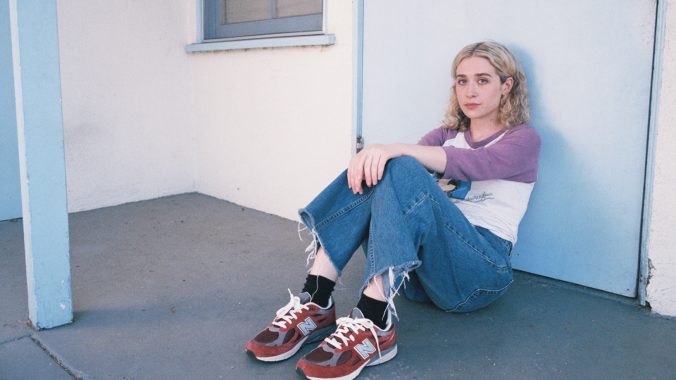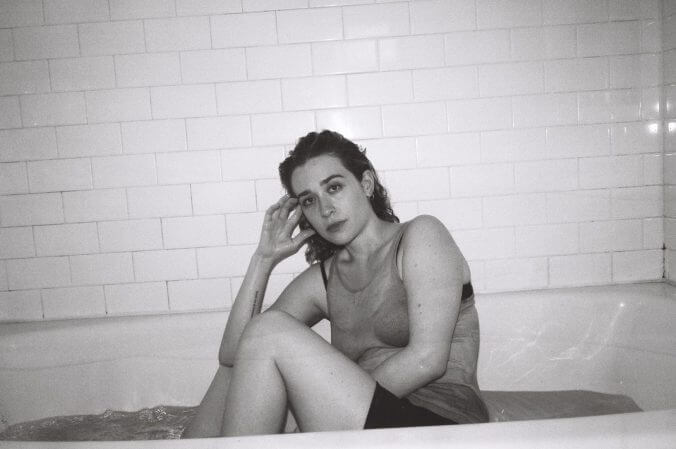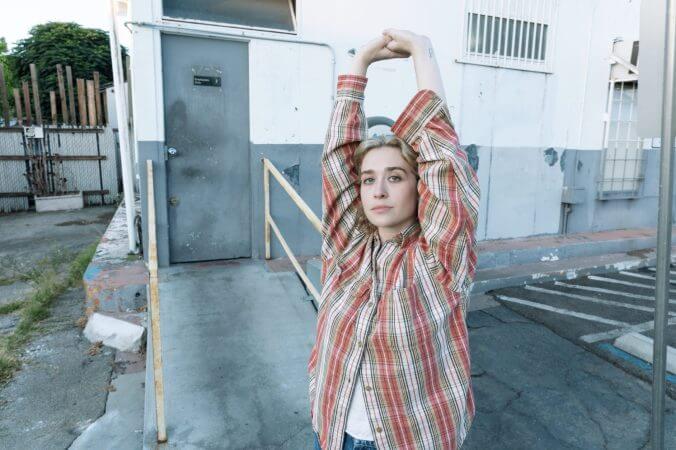Best of What’s Next: Blondshell
Photos by Daniel Topete
Three months ago, I thought it was obvious that Sabrina Teitelbaum—better known by her stage name, Blondshell—was going to be a big deal by April. However, I might have undersold Blondshell’s starpower potential at the time, as she just performed on The Tonight Show Starring Jimmy Fallon before her self-titled, debut album is even officially out. Her rise to indie stardom has been impressive, and joyous, to watch from afar. Not only is she a no-brainer Best of What’s Next; she’s also a no-brainer future festival headliner, Saturday Night Live musical guest and critical darling. It’s hard to do anything but root for her in every sense of the word, as she exudes a mountain of cool and is malleable enough to fully embrace whatever contemporary indie’s current, or her own eclectic, evolving taste, warrants from her songwriting.
The hype behind Blondshell is real. At SXSW last month, she stole the show—so much so that she took home the festival’s Grulke Prize for Developing U.S. Act. With over 1,500 acts in town, all vying for stage time, label notice and new fans, taking home that award has only become a bigger accolade in recent years. It’s no surprise that Blondshell won it, though. I caught her set at FLOODFest, where she performed on the indoor stage at the Mohawk, and she blew the whole room open. The space was tiny, overrun with muggy, Texas heat and packed beyond the brim. There were so many people crowded before Blondshell that I, and her manager, had to watch her from the part of the stairwell the band uses to climb onstage. In a vintage Neil Young shirt and a pair of jorts, she ran through a brisk setlist filled-out with tracks from Blondshell. Everybody in the venue sang every lyric with her.
Blondshell was born in New York City and raised across Midtown Manhattan by a single father. Early on, he introduced her to the wisdom of Bob Dylan and his influence helped her develop a childhood obsession with the Rolling Stones. She started writing breakup songs as a kid and, even back then, she thought she had the chops to make it as a real musician. But of course, with childhood dreams came rose-tinted glasses and, by the time Blondshell was old enough to drive, doubt crept in about whether or not she could get her music noticed based on her talent alone. “When I was a kid, I was like, ‘If you’re able to sing, that’s it,’” she tells me over the phone. “I didn’t know enough. Then, when I got older, I was like, ‘Oh, it requires really hard work, a ton of luck and lots of things that are really out of your control.’ It set in that it was definitely not a given and was actually unlikely that I would get to do it as a job.”
When she was 18, Blondshell moved to Los Angeles to attend the University of Southern California and study in their pop music program. That doesn’t mean she was in classes devoted to mapping out the pipeline from the Beatles to Rihanna. Instead, it was a way of making a distinction from the school’s classical performance and composition branch. “When I was a freshman, we focused on a lot of Motown,” Blondshell says. “The whole year was just learning about Motown, how they wrote those songs, the production elements, personnel, all of that stuff.” She’d stay in the program for two years before dropping out. When she got there, she didn’t know music theory, which stripped her of having a lot of confidence. “I was like, ‘I really don’t understand the chords I’m playing,’” she adds. “[The program] gave me a lot of tools that I think I needed. My ear got better. I can write harmonies now. Then I was like, ‘I gotta drop out because I want to start actually working.’”
Being on the West Coast primed Blondshell in ways the East Coast hadn’t. Back in New York, she wasn’t involved in any music scene. She was just a high schooler writing songs in her bedroom and using a fake ID to get into Bowery venues across the city. In Los Angeles, she found a community among people practicing dark pop, a genre that washed over many of the musicians there. “The people I was meeting, that was just what we were doing. It sent me on a path, genre-wise,” she says. “I learned from people, craft-wise. I learned a lot of little production things, little guitar things. I learned from the people I was around all the time.”

After leaving USC, under the moniker BAUM, Blondshell wrote herself out of burnout and made an EP called Ungodly and an electronic, nightclub banger called “Fuckboy” in 2019. It was a song with the right architecture, and it could’ve been plugged into any sonic landscape in the last 15 years and soar. More than anything, it was an immense flaunt of Blondshell’s abilities to craft compelling, hypnotic pop songs. That edge is still present in her songwriting process, but the BAUM stuff better serves as an archive of “all the feelings and thoughts” Blondshell had when she was 21. Her songs now are less digital and more explorative of grunge and folk. “I think I have a lot of instinct to write pop melodies,” she says. “It took me a minute to realize the genre that I wanted to make, because I didn’t know who I was enough yet. I just needed to grow up a little bit.”
There was never a time where Blondshell saw herself as anything but a songwriter. And, like many of us who devote all of our time and energy to the craft we’re passionate about, if our jobs don’t work out, where we would turn next could be scary and uncertain. “I don’t really have that many marketable skills other than music, because I spent my whole life focusing on it,” she says with a laugh. “Even when I was growing up, when I was in high school, this is just what I did when I wasn’t doing homework or hanging out with my friends.” Luckily, Blondshell scored a record deal with Partisan and assembled a brilliant debut record.
Most of Blondshell was written at the genesis of COVID in 2020, as a result of, as Blondshell puts it, “not a lot going on and having a lot of big feelings that I need to talk about.” The record has been fleshed out slowly, as six tracks have come out intermittently over the last nine months. The first single, “Olympus,” came in July 2022 and the last single, “Salad,” hit streaming this morning. The decision to put over half of the album out before its official release date was intentional and methodical. “I’ve looked at it like, ‘I’m introducing everybody to me and my music,’” Blondshell says. “I’m not trying to focus on ‘Hey, I have this body of work that I’ve made that I want you guys to pay attention to.’ I was just like, ‘I want to introduce myself,’ and I felt that the best way to do that is song by song. It’s just not as intimidating, either, for me or for people who are being introduced to the music.”
-

-

-

-

-

-

-

-

-

-

-

-

-

-

-

-

-

-

-

-

-

-

-

-

-

-

-

-

-

-

-

-

-

-

-

-

-

-

-

-









































